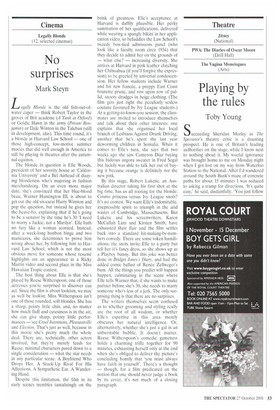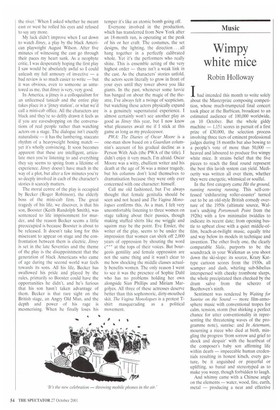Theatre
Jitney (National) PWA: The Diaries of Oscar Moore (Drill Hall) The Vagina Monologues (Arts)
Playing by the rules
Toby Young
ucceeding Sheridan Morley as The Spectator's theatre critic is a daunting prospect. He is one of Britain's leading authorities on the stage, while I know next to nothing about it. My woeful ignorance was brought home to me on Monday night when I got lost on my way from Waterloo Station to the National. After I'd wandered around the South Bank's maze of concrete paths for about 15 minutes I was reduced to asking a tramp for directions. 'It's quite easy,' he said, disdainfully. 'You just follow the river.' When I asked whether he meant east or west he rolled his eyes and refused to say any more.
My luck didn't improve when I sat down to watch Jitney, a play by the black American playwright August Wilson. After five minutes of witnessing the cast go through their paces my heart sank. As a neophyte critic, I was desperately hoping the first play I saw would be absolutely awful so I could unleash my full armoury of invective — a bad review is so much easier to write — but it was obvious, even to someone as untutored as me, that Jitney is very, very good.
In America, a jitney is a colloquialism for an unlicensed taxicab and the entire play takes place in a 'jitney station', or what we'd call a mini-cab office. All the characters are black and they're so deftly drawn it feels as if you are eavesdropping on the conversations of real people rather than watching actors on a stage. The dialogue isn't exactly naturalistic — it has the lumbering, staccato rhythm of a heavyweight boxing match — yet it's wholly convincing. It soon becomes apparent that these are intelligent, articulate men you're listening to and everything they say seems to spring from a lifetime of experience. Jitney doesn't have much in the way of a plot, but after a few minutes you're so deeply involved in each of the character's stories it scarcely matters.
The moral centre of the play is occupied by Becker (Roger Robinson), the elderly boss of the mini-cab firm. The great tragedy of his life, we discover, is that his son, Booster (Keith Randolph Smith), was sentenced to life imprisonment for murder, and the reason Becker seems a little preoccupied is because Booster is about to be released, It doesn't take long for this miscreant to appear on stage and the confrontation between them is electric. Jitney is set in the late Seventies and the theme of the play is the disappointment that the generation of black Americans who came of age during the second world war feels towards its sons. All his life, Becker has swallowed his pride and played by the rules, primarily so Booster could have the opportunities he didn't, and he's furious that his son hasn't taken advantage of them. Becker is that rare sight on the British stage, an Angry Old Man, and the depth and power of his rage is mesmerising. When he finally loses his temper it's like an atomic bomb going off.
Everyone involved in the production, which has transferred from New York after an 18-month run, is operating at the peak of his or her craft. The costumes, the set designs, the lighting, the direction . all hang together in a perfectly calibrated whole. Yet it's the performers who really shine. This is ensemble acting of the very highest order — there isn't a weak link in the cast. As the characters' stories unfold, the actors seem literally to grow in front of your eyes until they tower above you like giants. In the past, whenever some luvvie has banged on about the magic of the theatre, I've always felt a twinge of scepticism, but watching these actors physically expand is a genuinely supernatural experience. I almost certainly won't see another play as good as Jitney this year, but I now know what pleasures await me if I stick at this game as long as my predecessor.
PWA: The Diaries of Oscar Moore is a one-man show based on a Guardian columnist's account of his gradual decline as a Person With Aids (the PWA of the title). I didn't enjoy it very much, I'm afraid. Oscar Moore was a witty, ebullient writer and his death at the age of 36 was a minor tragedy, but his columns don't lend themselves to dramatisation because they were only ever concerned with one character; himself.
Call me old fashioned, but I've always thought that female genitalia should be seen and not heard and The Vagina Monologues confirms this. As a man, I felt very uncomfortable listening to three women on stage talking about their pussies, though making stuffed shirts like me wriggle and squirm may be the point. Eve Ensler, the writer of the play, seems to be under the impression that women can shirk off 2,000 years of oppression by shouting the word c*** at the tops of their voices. But bourgeois gentility and female oppression are not the same thing and it wasn't clear to me how shocking the middle classes actually benefits women. The only reason I went to see it was the presence of Sophie Dahl who has no problems holding her own alongside Sian Phillips and Miriam Margolyes. All three of these actresses deserve better than this sophomoric, dirty-mouthed skit. The Vagina Monologues is a protest Tshirt masquerading as a political movement.











































































 Previous page
Previous page